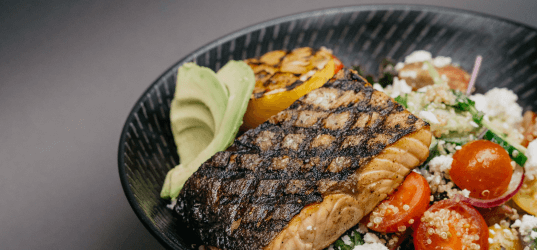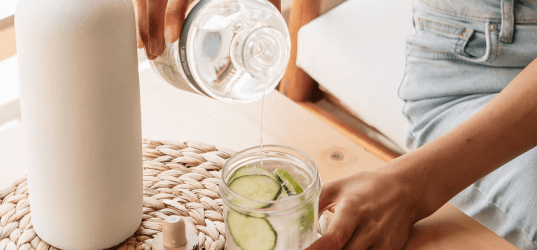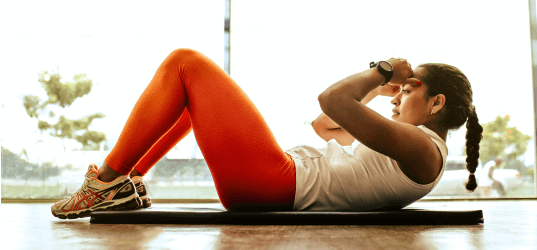Winter can be challenging on your immune system. People are more susceptible to colds and flu in the cooler temperatures, with viruses spreading more easily in dry air and closed environments. While it’s hard to avoid all viruses, we have a few easy tips to boost your immune system so that you can fight off infections with ease this winter.
 |
Eat a balanced, vitamin-filled dietIf you want to stay healthy in the cold weather, good food is essential. The foods you eat have a direct impact on your immune system — fresh, healthy ingredients are able to energise the body and stimulate the healing response. Eating lots of fresh, unprocessed foods — including fruits, vegetables, lean meat, and whole grains — is the best way to avoid winter sickness. Check out our trio of immune-boosting smoothie recipes here. |
Stay hydratedWater plays so many important roles in our bodies, especially when it comes to immune function. A dehydrated body is an unhealthy body and therefore may become more susceptible to viruses. Hydration allows your body to properly circulate the infection-fighting immune cells. Try to drink at least eight glasses of water per day. Keep a bottle of room-temperature water nearby or if you need something warm, a cup of herbal tea is a good alternative. |
 |
 |
Prioritise lots of stress-free restTo successfully fight diseases, the body needs to have enough energy. While healthy foods provide you with fuel, getting lots of sleep gives your immune system time to reset and regenerate. Not all sleep is equal, however — the best quality sleep is free of distractions and worries. You can improve the quality of your sleep by dealing with stressful events early in the day, turning off electronic devices, implementing a wind-down routine, and keeping to a regular sleeping schedule. |
Practice good hygieneRegular handwashing and bathing routines can stop many diseases in their tracks. Washing your hands every time you get home is a good idea and keeping a bottle of hand sanitiser in your car helps you to avoid exposure while on the go. Other personal hygiene habits are also important, including brushing your teeth often, covering your mouth and nose when you cough or sneeze, and trying not to touch your face too often when out in public. |
 |
 |
Move your bodyExercise is essential throughout the year, but it has even more impact during the colder months. Among other health benefits, exercising regularly allows you to regulate your blood pressure, and reduce your stress. This makes it easier for your circulatory system to respond quickly when an infectious disease enters the body. Consistency is key when it comes to exercise, so start small and try to develop a routine. |
Focus on maintaining a balanced diet, staying hydrated, and engaging in regular exercise to give your immune system the best chance at fighting off infections this winter. Stay warm and stay well!
 |
Eat a balanced, vitamin-filled dietIf you want to stay healthy in the cold weather, good food is essential. The foods you eat have a direct impact on your immune system — fresh, healthy ingredients are able to energise the body and stimulate the healing response. Eating lots of fresh, unprocessed foods — including fruits, vegetables, lean meat, and whole grains — is the best way to avoid winter sickness. Check out our trio of immune-boosting smoothie recipes here. |
 |
Stay hydratedWater plays so many important roles in our bodies, especially when it comes to immune function. A dehydrated body is an unhealthy body and therefore may become more susceptible to viruses. Hydration allows your body to properly circulate the infection-fighting immune cells. Try to drink at least eight glasses of water per day. Keep a bottle of room-temperature water nearby or if you need something warm, a cup of herbal tea is a good alternative. |
 |
Prioritise lots of stress-free restTo successfully fight diseases, the body needs to have enough energy. While healthy foods provide you with fuel, getting lots of sleep gives your immune system time to reset and regenerate. Not all sleep is equal, however — the best quality sleep is free of distractions and worries. You can improve the quality of your sleep by dealing with stressful events early in the day, turning off electronic devices, implementing a wind-down routine, and keeping to a regular sleeping schedule. |
 |
Practice good hygieneRegular handwashing and bathing routines can stop many diseases in their tracks. Washing your hands every time you get home is a good idea and keeping a bottle of hand sanitiser in your car helps you to avoid exposure while on the go. Other personal hygiene habits are also important, including brushing your teeth often, covering your mouth and nose when you cough or sneeze, and trying not to touch your face too often when out in public. |
 |
Move your bodyExercise is essential throughout the year, but it has even more impact during the colder months. Among other health benefits, exercising regularly allows you to regulate your blood pressure, and reduce your stress. This makes it easier for your circulatory system to respond quickly when an infectious disease enters the body. Consistency is key when it comes to exercise, so start small and try to develop a routine. |
Focus on maintaining a balanced diet, staying hydrated, and engaging in regular exercise to give your immune system the best chance at fighting off infections this winter. Stay warm and stay well!